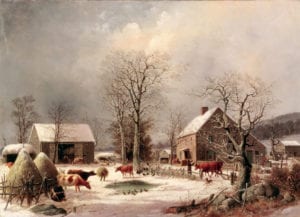
Things Could Always Be Worse: a story for the sixth night of Chanukah
So, I’m sure most of you already know this story. It goes with the podcast, but it’s a great story, and one that is usually told in our family, coming up to any major festival where present-giving is involved – usually as the younger members of the family are complaining about how hard life is, how they don’t get enough space, and, probably, nobody understands them, so they won’t get what they want, present-wise.
That was usually the point when my Bubbe (pronounced Bubbeh) would tell this story.
Long ago, in a little village just outside Vilna, there lived a farmer and his wife, along with his four children. They lived in a small little house, but the fire was always welcoming, visitors were never sent away, and, when the farmers’ parents become too old to look after themselves, the farmer and his wife welcomed them into their home – along with all the furniture and knick-knacks and things that the old women just could not live without.
Click the ‘Play’ icon to listen to this Podcast
From that moment on, the rows started. Something would get broken; the old women would cry, and throw blame at her daughter in law. The old man’s back would hurt; he threw blame at the children making so much noise he could hardly sleep. The bread did not rise; the farmer’s wife threw blame on the way her husband had harvested the corn. The children would cry and blame the scary stories their grandmother told them. They fought and argued the day through and the night down, until even the cockerel was too tired to make himself heard in the mornings!
This situation could not go on, so the farmer went to see the rabbi to ask for a solution.
“Well,” said the rabbi, “In life, there are always two possibilities, whatever happens.”
He offered the farmer a drink, stroked his beard, and thought. The farmer held his breath, waiting for some divine pearl of wisdom to fall from the sage’s mouth. Eventually the rabbi appeared to come to some conclusions. Smiling at the farmer, he said, “Do you own chickens?”
Puzzled the farmer replied that, yes, he did indeed own several chickens.
“Good, good, then bring them indoors. It’s very chilly out at this time of the year,” and he went back to his contemplation.
The bemused farmer went home and told his wife – and, of course, how could they go against the very advice they had sought? So they brought in the chickens. The house was even more crowded, noisy and smelly, and more than chicken feathers flew that week I can tell you! The farmer went back, and repeated the problem, explaining that now it was even worse. The rabbi thought, and then said, with a twinkle in his eye, “You have a donkey?”
Hesitating, the man nodded; he did indeed have a donkey. “Then bring it inside with you and your family. The warmth will do it good!”
The man nodded, and went home to do as the rabbi instructed. Well, that week was even worse: the rowing, the clucking, the braying the noise and confusion – not to mention the mess. His poor wife and mother – as fast as they cleared up, there was more mess and feathers then ever before, but everyone agreed the eggs were good.
This went on for several more weeks, the rabbi’s instructions getting more bizarre, but the man following them to the letter, until residing in that one small cottage was: himself; his wife; his mother and father; his children; a flock of hens and geese; a donkey; a horse; and a very flatulent cow.
After one month he made his way, exhausted, to the rabbi’s house.
“Every week I have told you how bad my life is, Rabbi, and every week you have had me bring more and more livestock into the house. I cannot bear it! My life is not worth living.”
The rabbi stroked his beard.
“Hmm. Well, maybe you should take out all the animals and put them back in the barns.”
”Yes, Rabbi … thank you! That is an excellent suggestion.”
And he ran back home to do as instructed.
What a change! How they celebrated! And the next Sabbath he went and shook hands with the rabbi. He thanked him over and over, saying,
“Rabbi, who could have known? Such space! Such a good life! Such room! And my wife and mother – how they get along! Truly, life is good!”
Sometimes we have to see how bad it can really get before we realize how good we have it – maybe?